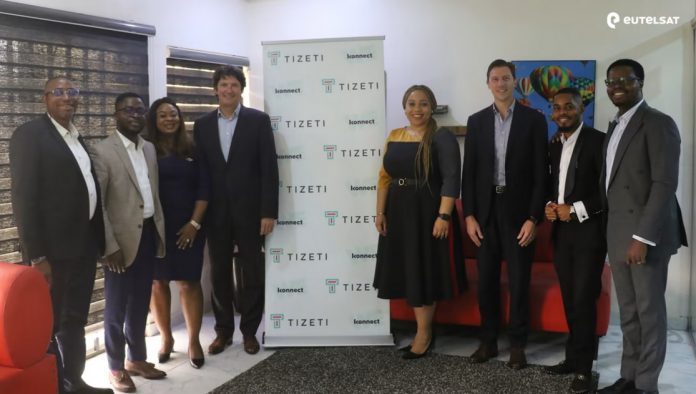Eutelsat Communications, the leading satellite operator has inked a deal with Tizeti, West Africa’s pioneer solar-based internet service provider and a leading provider of community connectivity solutions to jointly improve broadband penetration in Nigeria, especially in underserved locations.
The two companies announced during the sidelines of the AfricaCom 2022 trade fair that they will deploy Eutelsat’s KA-band satellite connectivity, Konnect, to reach remote communities throughout Nigeria and provide fast, and affordable internet services.
Despite 44.5 percent broadband penetration, covered largely by Mobile Network Operators, reliable internet connectivity is still limited to a few states.
The partnership between Tizeti and Eutelsat will provide a complementary solution that leverages satellite broadband infrastructure and Tizeti’s community Wi-FI management platform to deliver a fast and affordable public wi-fi hotspot service, especially in remote areas that are difficult to reach by terrestrial broadband infrastructure.
Philippe Baudrier, Eutelsat’s General Manager – Connectivity for Africa said “Eutelsat’s ambition is to connect one million unserved people across sub-Saharan Africa to high-speed internet over the next 5 years and this partnership with Tizeti will help bridge Nigeria’s digital divide and unlock the wealth of social and economic opportunities that the internet brings”.
Speaking on the partnership, Tizeti’s Chief Executive Officer of Tizeti, Kendall Ananyi, said that satellite broadband will complement Tizeti’s existing initiatives and lay a foundation for a robust and thriving digital ecosystem across Nigeria.
“Our partnership with Eutelsat extends our mission of bringing affordable and reliable internet to more Nigerians and provides us with the opportunity to accelerate the expansion of broadband internet via satellite, to bridge the digital gap and improve digital transformation for more Nigerians”, Ananyi said.
Konnect’s Community Wi-Fi (Konnect Wi-Fi) initiative has already seen considerable success across Africa with hundreds of sites providing internet access to tens of thousands of people every week.
For many countries in Africa, there is still a huge digital divide. This boundary between connected and unconnected translates into clear consequences for employment, education, family and social life, and access to information.
Partnerships such as this play a significant role in addressing the digital infrastructure deficits in emerging economies, leveraging innovative technology and capabilities, to improve development outcomes for millions of people.













